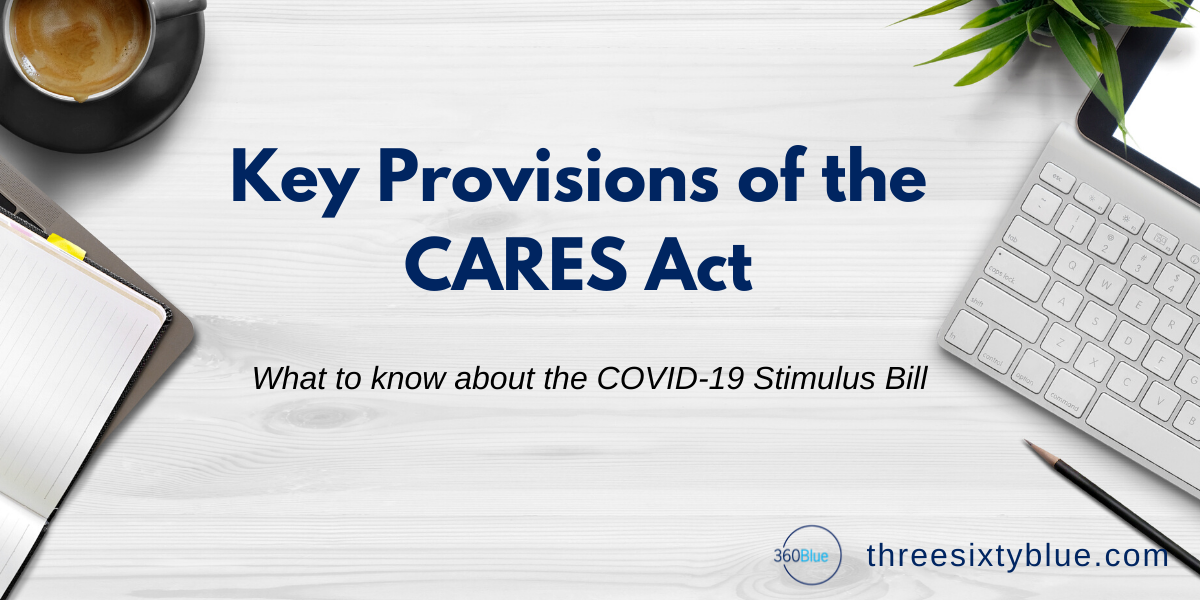Key Provisions of the CARES Act
Submitted by 360Blue Financial Strategies on April 6th, 2020
Distributions can be waived in 2020 for Inherited Accounts, 401(k)s, and IRAs.
Recently, the $2 trillion "Coronavirus Aid, Relief, and Economic Security" ("CARES") Act was signed into law. The CARES Act is designed to help those most impacted by the COVID-19 pandemic, while also providing key provisions that may benefit retirees.1
To put this monumental legislation in perspective, Congress earmarked $800 billion for the Economic Stimulus Act of 2008 during the financial crisis.1
The CARES Act has far-reaching implications for many. Here are the most important provisions to keep in mind:
Stimulus Check Details. Americans can expect a one-time direct payment of up to $1,200 for individuals (or $2,400 for married couples) with an additional $500 per child under age 17. These payments are based on the 2019 tax returns for those who have filed them and 2018 information if they have not. The amount is reduced if an individual makes more than $75,000 or a couple makes more than $150,000. Those who make more than $99,000 as an individual (or $198,000 as a couple) will not receive a payment.1
Business Owner Relief. The act also allocates $500 billion for loans, loan guarantees, or investments to businesses, states, and municipalities.1
Your Inherited 401(k)s. People who have inherited 401(k)s or Individual Retirement Accounts can suspend distributions in 2020. Required distributions don't apply to people with Roth IRAs; although, they do apply to investors who inherit Roth accounts.2
RMDs Suspended. The CARES Act suspends the minimum required distributions most people must take from 401(k)s and IRAs in 2020. In 2009, Congress passed a similar rule, which gave retirees some flexibility when considering distributions.2,3
Withdrawal Penalties. Account owners can take a distribution of up to $100,000 from their retirement plan or IRA in 2020, without the 10-percent early withdrawal penalty that normally applies to money taken out before age 59½. But remember, you still owe the tax.4
Many businesses and individuals are struggling with the realities that COVID-19 has brought to our communities. The CARES Act, however, may provide some much-needed relief. Contact your financial professional today to see if these special 2020 distribution rules are appropriate for your situation.
Under the CARES act, an account holder who already took a 2020 distribution has up to 60 days to return the distribution without owing taxes on it. This material is not intended as tax or legal advice. Please consult legal or tax professionals for specific information regarding your individual situation. Under the SECURE Act, your required minimum distribution (RMD) must be distributed by the end of the 10th calendar year following the year of the Individual Retirement Account (IRA) owner's death. Penalties may occur for missed RMDs. Any RMDs due for the original owner must be taken by their deadlines to avoid penalties. A surviving spouse of the IRA owner, disabled or chronically ill individuals, individuals who are not more than 10 years younger than the IRA owner, and children of the IRA owner who have not reached the age of majority may have other minimum distribution requirements.
Under the CARES act, an accountholder who already took a 2020 distribution has up to 60 days to return the distribution without owing taxes on it. This material is not intended as tax or legal advice. Please consult legal or tax professionals for specific information regarding your individual situation. Under the SECURE Act, in most circumstances, once you reach age 72, you must begin taking required minimum distributions from a Traditional Individual Retirement Account (IRA). Withdrawals from Traditional IRAs are taxed as ordinary income, and if taken before age 59½, may be subject to a 10% federal income tax penalty. You may continue to contribute to a Traditional IRA past age 70½ under the SECURE Act, as long as you meet the earned-income requirement.
Account holders can always withdraw more. But if they take less than the minimum required, they could be subject to a 50% penalty on the amount they should have withdrawn – except for 2020.
This material was prepared by MarketingPro, Inc., and does not necessarily represent the views of the presenting party, nor their affiliates. This information has been derived from sources believed to be accurate. Please note - investing involves risk, and past performance is no guarantee of future results. The publisher is not engaged in rendering legal, accounting or other professional services. If assistance is needed, the reader is advised to engage the services of a competent professional. This information should not be construed as investment, tax or legal advice and may not be relied on for the purpose of avoiding any Federal tax penalty. This is neither a solicitation nor recommendation to purchase or sell any investment or insurance product or service, and should not be relied upon as such. All indices are unmanaged and are not illustrative of any particular investment.
Citations.
1 - CNBC.com, March 25, 2020.
2 - The Wall Street Journal, March 25, 2020.
3 - The Wall Street Journal, March 25, 2020.
4 - The Wall Street Journal, March 25, 2020.

